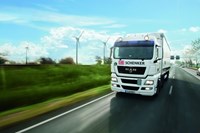
DB Schenker will reduce its specific greenhouse gas emissions by at least 40% relative to its 2006 figures. Thanks to this pledge, the logistics company will play a key role in the
DB Group's mission to reach its new climate targets, which entail the specific reduction of greenhouse gases by at least 50% in the same time period. At present, DB Schenker is the source of almost two-thirds of the Group's total emission figures. By delivering reductions in its sector, the logistics service provider will make a commensurate contribution to the Group's overall goals.
"Moving away from fossil fuels will be the greatest challenge. Following the example of rail services and their ever-growing sourcing of green energy, road haulage now has to make the energy transition – and is successfully at that. Air and ocean freight need to explore new technologies. We monitor their development and will support their introduction with our possibilities", says Andrea Dorothea Schön, who heads up DB Schenker's climate protection program. "What we need here is full coordination between all the actors in the supply chain and the world of politics."
At the start of 2017, DB Schenker pledged that its growth in the coming decade would be
CO2 neutral. As a result, it increased its specific annual goals for overland and air freight by up to 3% per annum from 2020 onwards. Additional reductions are planned for ocean freight as well, despite the fact that a specific reduction of 62% has been achieved already since 2006. "Given the massive continued expansion expected for international container shipping, we are also committed to CO2-neutral growth in this sector," says Andrea Schön.
Some 95% of CO2 emissions at DB Schenker are due to service providers, which comprise approximately 40,000 companies around the world. DB's logistics subsidiary uses its national branches to help contract partners by researching new technology, pilot projects, and providing help with accessing support programs.
DB Schenker inaugurated 2018 by its switching distribution activities in Paris to electrically powered vehicles. "Our scheme in Paris makes us one of the first companies to make a clear commitment to CO2-free transportation," says Tariel Chamerois, sustainability manager at
DB Schenker in France and Vice President of European logistics association CLECAT. Similarly, DB Schenker already runs some 800 vehicles in Sweden on sustainably produced biofuels – this way, the company has replaced close to one-third of its diesel consumption with a renewable energy source.




Comments
There are no comments yet for this item
Join the discussion